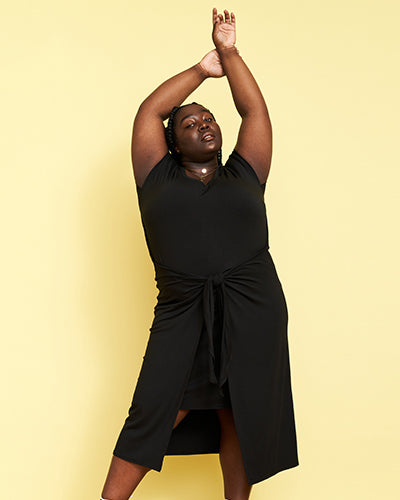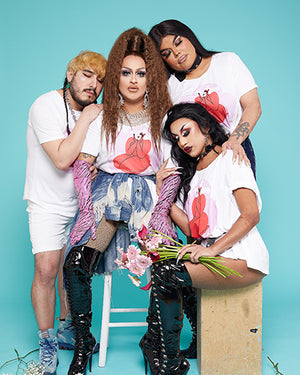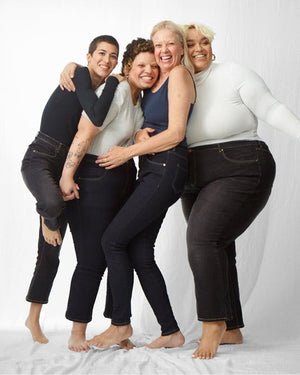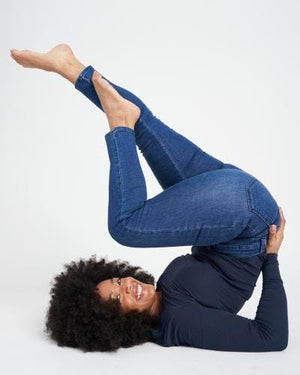
Why Do We Have To “Bounce Back” After Pregnancy?
Ash Luna is a Chicago-based photographer, writer, and parent. They are also the founder of 4th Trimester Bodies Project.
I’ve been a parent and a photographer working with mostly pregnant and postpartum people for the last 14 years. During that time, society has come a long way in embracing and supporting gestating humans, particularly when viewed through the lens of pop culture; Remember when Annie Leibowitz and Demi Moore made waves in 1991 with a glorious pregnant nude photograph on the cover of Vanity Fair? In the years since, we’ve seen thoughts and language shift: pregnancy went from being something to hide away to something we celebrate. From form-fitting pregnancy-friendly clothing, to the boon of maternity photoshoots, and celebrity icons like Serena Williams and Beyonce showing their full round bellies like the goddesses they are; pregnant people are seemingly more celebrated and supported than ever.
The thing about pregnancies though, is that even under the most ideal circumstances, they last nine months, you give birth, and the world keeps moving. At that point, the focus shifts almost exclusively to the baby. Babies are cute, of course, but what about the human attached to the body they just emerged from? Postpartum people are often left unsupported as they heal physically, emotionally, cosmically from an event that forever changes us, and in the midst of this they are tasked with meeting the needs of a brand new human fully dependent on them.
All of this begs one important question; Why is it so easy to celebrate the godlike images of pregnant people and their bellies, but so easy to forget that person once the baby is born?

Unfortunately, even in 2019 there is still industry after industry built upon telling postpartum people that they need to immediately erase any signs of pregnancy and birth from their bodies. From magical potions that “promise” to erase stretch marks, to wraps and surgeries to rid you of that “mummy tummy,” to diets and work out plans that exist not to help you heal from actual pregnancy and birth-related injuries but to encourage you to instead “bounce back” to some former version of yourself.
The industry is pervasive, predatory, and it is loud.
My work gives me a front row seat to the relationship postpartum humans have with their bodies. I have the privilege of seeing a large number of people on the other side of birth naked and in their underwear on my sets, through my camera, and on my computer as I spend hours selecting, processing, and sharing their images and stories. I see a lot of stretch marks, cesarean scars, leaky breasts, and bodies that exist outside of the box we’re trained to see as conventionally beautiful. And yet in every single image all I see is beauty. I see the joy, power, and often heartache that accompany us through this transition in life. I see humans who may otherwise be self-conscious, lovingly embracing their children without another care in the world. I see humans who are at peace with themselves proudly staring back at me eager to challenge the status quo. I see lots of humans in the grand space in-between ready to put themselves out there to not only be seen and heard, but to add to the expansive visual archive of what normal, beautiful, powerful actually is.
This work I do, these stories I share, beg me to ask you — what if we don’t need to bounce back, after all? What if doing so isn’t even possible? What if we can instead shift our focus to embracing, dare even, celebrating, the evolution of our bodies during pregnancy, birth, and postpartum?

Pregnancy often pushes the elasticity of skin to its limits and so stretch marks are formed. Rivers and valleys and roadmaps of the lives that once grew within. Our hips shift and spread in ways that innately alter the shape of our before and after. Regardless of how we choose to feed our babies our chests grow and stretch and shrink and droop, sometimes all at once. We can birth in ways that leave us with deep rich scars on our bellies, on our vulvas, scars that sometimes fade, sometimes itch or hurt, sometimes remain as visible as the day they were made. Our bellies squish with a softness, a new shelf for tiny toes, as our organs shift back into place, as suppleness that sometimes fades or firms and sometimes just stays. Whether we embrace it or not, we evolve. Just as we will never be the humans we were before we became parents, our bodies will never not tell the tale. Whether we choose to see these changes as something to erase or celebrate is up to us, of course, but it’s beyond time we stop letting others sell us into believing that our bodies are inherently flawed simply for showing signs of what they’ve accomplished.
There is nothing wrong with moving your body in ways that feel good to you.
There is nothing wrong with eating foods that help you to feel good.
There is nothing wrong with choosing to shift your body weight within another range that is suitable for your body because you want or need to.
There is nothing wrong with continuing to exist just as you are today and tomorrow.
There is, however, something wrong with newly postpartum people being a target market for diets, potions, and harmful industries who ignore the fact that our bodies not only need time to heal, but the fact that all they are going through something that is perfectly, beautifully, boringly, normal.
So how do we change this all? We can normalize what is normal by first acknowledging it to be true - this fact that our bodies will and do change and evolve with time and experience. By fighting back against the notion that gestating, birthing, and feeding humans somehow “ruins” our bodies. We can embrace it by diving into communities and conversation that focuses on the realities and nuances of life after birth — the beautiful mess that it is. By viewing images of what postpartum bodies actually look like in all their glory. By not only choosing to reframe ourselves through a lens of positivity and self love, but by liberating ourselves entirely from the expectation that we have to shrink down, firm up, stay youthful, and perform to be worthy or valid. By acknowledging that we don’t even have to love every bit of ourselves to hold that worth or validity, we can actually just be. We can decide for ourselves that bouncing back just isn’t a reality, and can instead choose to embrace our evolution.
No matter which stage of pregnancy you’re in, FIT LIBERTY (MOM) has your back. It’s not maternity clothing, it’s a collection of clothing, curated in partnership with actress and soon-to-be mom Danielle Brooks, that you can wear anytime - when you’re pregnant, and when you’re not. When your size changes, well replace your clothes, in your new size - for free. FIT LIBERTY (MOM) gives you the freedom to change sizes without fear, anxiety, or added expense. Explore the collection page here.




